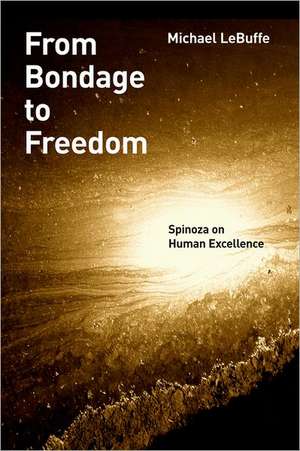From Bondage to Freedom: Spinoza on Human Excellence
Autor Michael Lebuffeen Limba Engleză Hardback – 18 feb 2010
Preț: 569.43 lei
Preț vechi: 816.31 lei
-30% Nou
Puncte Express: 854
Preț estimativ în valută:
108.96€ • 114.05$ • 90.69£
108.96€ • 114.05$ • 90.69£
Carte tipărită la comandă
Livrare economică 19-25 martie
Preluare comenzi: 021 569.72.76
Specificații
ISBN-13: 9780195383539
ISBN-10: 0195383532
Pagini: 272
Dimensiuni: 236 x 155 x 28 mm
Greutate: 0.53 kg
Editura: Oxford University Press
Colecția OUP USA
Locul publicării:New York, United States
ISBN-10: 0195383532
Pagini: 272
Dimensiuni: 236 x 155 x 28 mm
Greutate: 0.53 kg
Editura: Oxford University Press
Colecția OUP USA
Locul publicării:New York, United States
Recenzii
All Spinoza specialists will want to read this book, and it will also be of value to anyone who wants to understand Spinoza's ethical views.
Michael LeBuffe's book From Bondage to Freedom: Spinoza on Human Excellence is a major contribution to Spinoza scholarship and the history of ethics. Over the past decade there has been a significant increase of articles and chapters devoted to aspects of the moral theory of the Ethics. LeBuffe's is the first systematic and in-depth treatment of the subject in English in seventy years. Unlike its predecessor, From Bondage to Freedom will continue to be closely studied in another seventy. The quality of the research is first-rate. The writing style is clear and direct. The lines of interpretation are insightful and well argued for. At last there is a careful and comprehensive work that advances scholarship on one of the great moral systems in the history of ethics.
Michael LeBuffe's From Bondage to Freedom: Spinoza on Human Excellence is an excellent presentation of Spinoza's moral theory. LeBuffe presents and analyzes not only the moral theory itself but also its place in Spinoza's system. This book is a significant contribution that ought to be read by anyone interested in the ethics or moral psychology of early modern philosophy, in addition to Spinoza scholars. In the end, LeBuffe's engaging account unifies Spinoza's project in a way few others do and it does so around what is undoubtedly Spinoza's own central concern -- the means by which human beings may move from bondage to freedom.
I found LeBuffe's book extremely helpful, philosophically stimulating, and engaging. This is a highly important work on some of the most central elements of Spinoza's philosophy, and it will entice scholarly debates for many years to come.
Michael LeBuffe's book From Bondage to Freedom: Spinoza on Human Excellence is a major contribution to Spinoza scholarship and the history of ethics. Over the past decade there has been a significant increase of articles and chapters devoted to aspects of the moral theory of the Ethics. LeBuffe's is the first systematic and in-depth treatment of the subject in English in seventy years. Unlike its predecessor, From Bondage to Freedom will continue to be closely studied in another seventy. The quality of the research is first-rate. The writing style is clear and direct. The lines of interpretation are insightful and well argued for. At last there is a careful and comprehensive work that advances scholarship on one of the great moral systems in the history of ethics.
Michael LeBuffe's From Bondage to Freedom: Spinoza on Human Excellence is an excellent presentation of Spinoza's moral theory. LeBuffe presents and analyzes not only the moral theory itself but also its place in Spinoza's system. This book is a significant contribution that ought to be read by anyone interested in the ethics or moral psychology of early modern philosophy, in addition to Spinoza scholars. In the end, LeBuffe's engaging account unifies Spinoza's project in a way few others do and it does so around what is undoubtedly Spinoza's own central concern -- the means by which human beings may move from bondage to freedom.
I found LeBuffe's book extremely helpful, philosophically stimulating, and engaging. This is a highly important work on some of the most central elements of Spinoza's philosophy, and it will entice scholarly debates for many years to come.
Notă biografică
Michael Lebuffe is Associate Professor of Philosophy at Texas A&M University.
